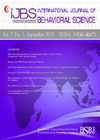Using Household Production Models to Understand Environmental Health Outcomes in Developing Countries
Main Article Content
Abstract
This research article presents a conceptual model to study the relationship between environment, health and economics. The main economic theories behind this study are the household production model and the utility maximization model. From the literature, health can be considered as a commodity that directly contributes to individual's utility. The constraints for this study are both the income constraint and the health production constraint. This study proposes that any household can derive utility from the children in the household being healthy, and a composition of good consumption. In addition, a child’s health is conditioned by care giving, demographic factors and environmental factors. Hence, how changes in environmental quality impact on the household production function can be measured from this model. This research article could be useful for the future studies related to analyze the linkages between health, environment and economics. Further research under the household production theory will benefit the policy maker in terms of understanding household behavior in order to improve public policies.
Keywords: household production model, utility maximization, environmental health


